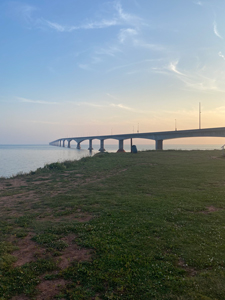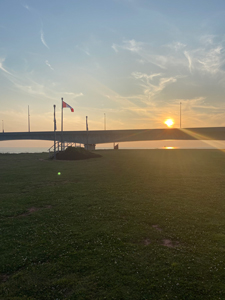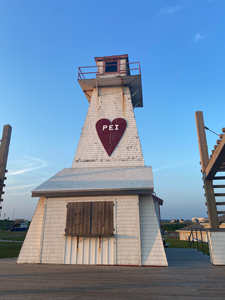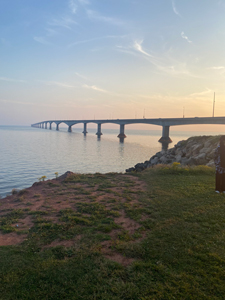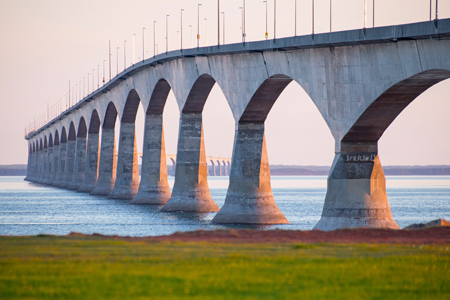The Confederation Bridge
LocationThe Confederation Bridge connects Borden-Carleton in Prince Edward Island with Cape Jourimain in New Brunswick, spanning the Northumberland Strait.
LengthThe bridge is 12.9 kilometers (8 miles) long, making it the longest bridge in Canada and the longest in the world crossing ice-covered water.
ConstructionThe bridge was constructed between 1993 and 1997, with its official opening on May 31, 1997. It was one of the most significant infrastructure projects in Canadian history.
PurposeIt was built to provide a year-round fixed link between PEI and the mainland, replacing the ferry service that was previously the primary means of transport.
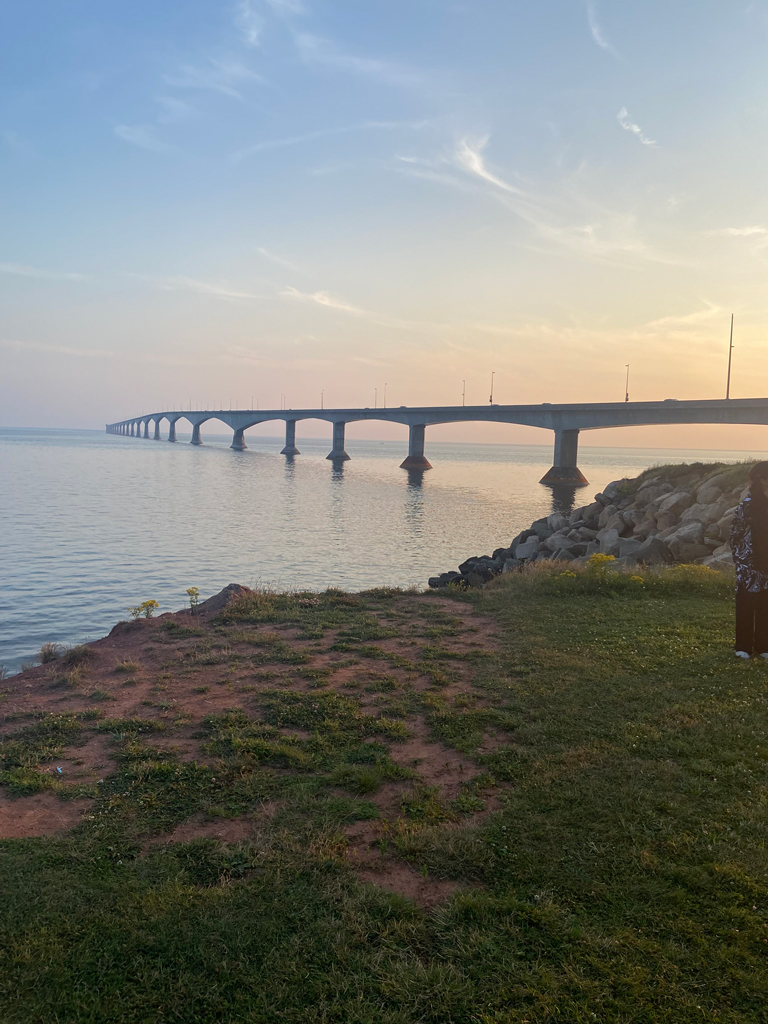
The Confederation Bridge Design and Engineering
StructureThe bridge is a multi-span, post-tensioned concrete box girder structure. It rests on 62 piers, each designed to withstand the harsh conditions of the Northumberland Strait, including ice floes and strong currents.
HeightThe bridge stands approximately 40 to 60 meters (131 to 197 feet) above the water, allowing ships to pass beneath. The clearance for ships is 60 meters at its highest point.
Toll BoothsThere are toll booths on the PEI side of the bridge where motorists pay a fee when leaving the island. The toll is only charged when leaving PEI, not when entering.
Wind and Ice ProtectionThe bridge’s design includes a solid guardrail to shield vehicles from strong winds, and the piers are shaped to break up ice as it flows through the strait, reducing the impact on the structure.
The Confederation Bridge Economic and Social Impact
Economic BenefitsThe bridge has had a profound impact on PEI’s economy. It has enhanced trade, tourism, and transportation by providing a reliable and efficient connection to the mainland. Businesses have benefited from reduced transportation costs and more consistent access to markets.
TourismThe Confederation Bridge itself has become a tourist attraction, with visitors often stopping at nearby viewpoints or visiting the interpretive centers to learn about its construction and significance.
Year-Round AccessBefore the bridge, PEI was connected to the mainland by a ferry service that was limited by ice conditions in the winter. The bridge now provides uninterrupted, year-round access, greatly improving the convenience of travel to and from the island.
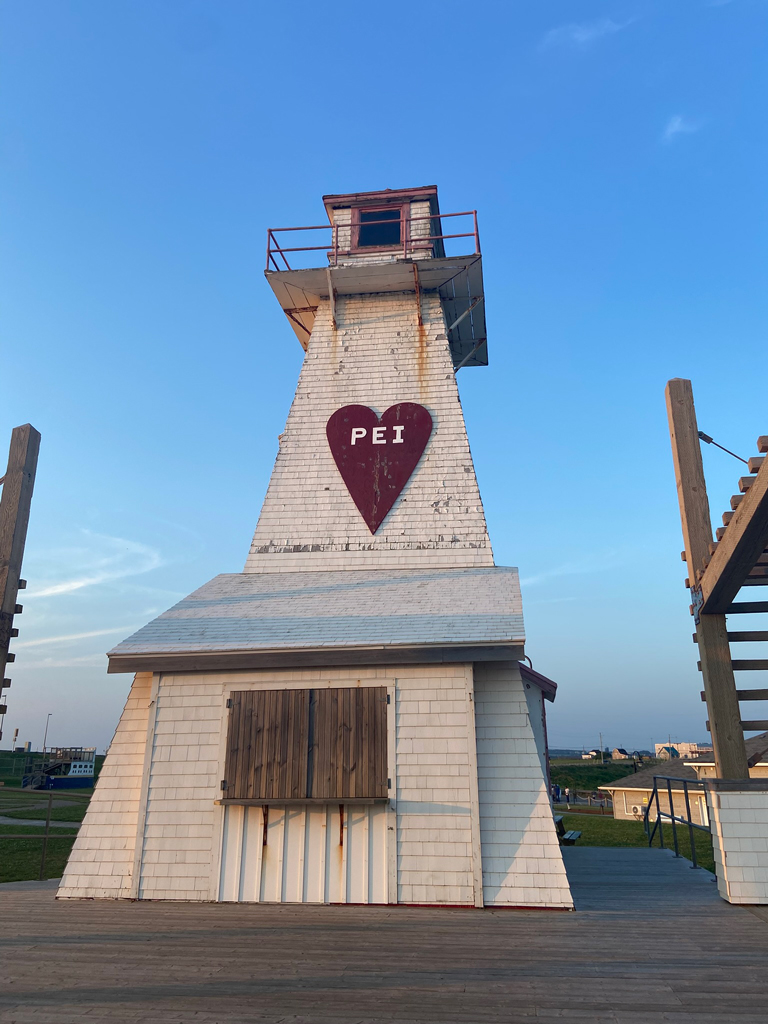
The Confederation Bridge Environmental and Cultural Considerations
Environmental ImpactThe construction of the Confederation Bridge was subject to rigorous environmental assessments. Measures were taken to minimize the impact on marine life and the surrounding ecosystem. The bridge’s design also considered the movement of ice and the potential effects on local fisheries.
Cultural ImpactWhile the bridge has brought many benefits, it also marked the end of an era for the ferry service that had operated for over a century. The bridge’s construction was met with mixed feelings, as some Islanders felt it would change the character of PEI. However, over time, it has become an accepted and integral part of island life.
The Confederation Bridge Usage and Maintenance
TrafficThe Confederation Bridge sees a significant amount of traffic, particularly during the summer tourist season. It accommodates vehicles, including cars, trucks, and buses, but is not open to pedestrians or cyclists. Special arrangements, such as shuttle services, are available for those traveling without a vehicle.
Toll CostsAs of 2024, the toll for a standard two-axle vehicle is around $50 to $60 CAD. Additional charges apply for vehicles with more axles or those towing trailers. Discounts are available for local residents and frequent users.
MaintenanceThe bridge undergoes regular inspections and maintenance to ensure its safety and longevity. The concrete structure is designed to withstand the challenging conditions of the Northumberland Strait for over a century.
The Confederation Bridge Fun Facts
NicknameThe bridge is sometimes affectionately referred to as the "Fixed Link" by Islanders, a reference to its role in permanently connecting PEI to the mainland.
Construction TimeIt took four years to construct the bridge, with over 5,000 workers involved in the project.
VisibilityOn clear days, the bridge is visible from both sides of the strait, creating a striking visual connection between PEI and New Brunswick.
The Confederation Bridge Visitor Experience
Interpretive CentersVisitors can learn more about the Confederation Bridge at the interpretive centers located near the bridge on both the PEI and New Brunswick sides. These centers offer exhibits on the construction, history, and impact of the bridge.
Scenic ViewsThe bridge offers stunning views of the Northumberland Strait, especially at sunrise or sunset. Viewing areas on both sides provide opportunities to take photos and appreciate the scale of the structure.
The Confederation Bridge is more than just a transportation route; it’s a symbol of connection and progress for Prince Edward Island, linking the island with the rest of Canada and the world.


